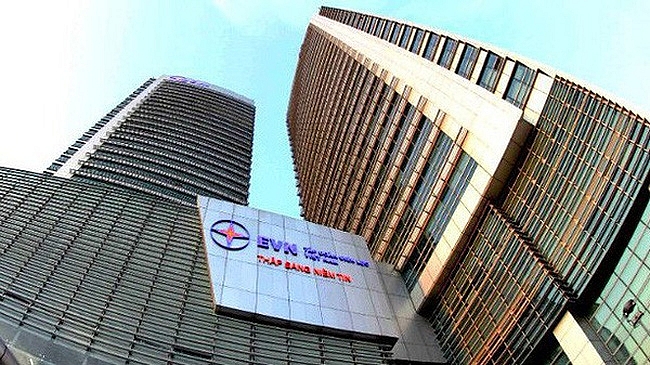Massive divestments to leave only three state-owned groups by 2020
 |
| EVN will be one of the three remaining state-owned groups by 2020 |
Strong SOE equitisation moves in early 2018
In the first quarter of 2018, a total of VND21.3 trillion ($0.94 billion) was earned in proceeds from the initial public offering (IPO) of SOEs, while it was only VND2.3 trillion ($0.1 billion) during the entire 2017.
These included hundred million dollar deals. In late January, PetroVietnam Power Corporation (PV Power) acquired VND6.99 trillion ($307.8 million) from selling 468.37 million shares, equalling 20 per cent of its charter capital, via its IPO. PV Power will sell 676 million more shares, or 29 per cent of its charter capital, to strategic investors.
Meanwhile, Binh Son Refining and Petrochemical Company Limited (BSR) conducted its IPO to sell 242 million shares, equalling 7.79 per cent of its charter capital to earn VND5.57 trillion ($245.26 million) in proceeds, 1.5 times higher than its expectations. 147.83 million of these shares, equalling 61.2 per cent of the offered share volume, were bought by foreign investors. The average selling price was VND23,043 ($1.01), while the initial unit price was VND14,600 ($0.64).
Also in late January, PetroVietnam Oil Corporation (PV Oil) successfully conducted its IPO by selling all 207 million shares offered, equalling 20 per cent of its charter capital. The average share price was VND20,196 ($0.89), fetching VND4.16 trillion ($185 million) in proceeds for the company.
Although the selling price of Vietnam Rubber Group (VRG) and Hanoi Trade Corporation (Hapro) was not much higher than the initial price, the state also acquired VND1.311 trillion ($57.75 million) and VND971 billion ($42.8 million) from their IPOs.
| Vietcombank's IPO in 2007 is still the biggest IPO held by an SOE ever, gaining VND10 trillion ($440 million) in proceeds. |
By late 2019, a series of large-sized SOEs will be equitised according to government plans, including Vinataba, Vietnam Paper Corporation (Vinapaco), MobiFone, Vinacafé, several VNPT subsidiaries, Vietnam National Chemical Group (Vinachem), and Vietnam National Coal and Mineral Industries Holding Corporation Limited (Vinacomin).
The equitisation of the SOEs, along with divestment of state capital in equitised enterprises, poses a good opportunity for domestic and foreign investors, especially in the context of stable economic conditions and good growth indicators.
Tundra, a Swedish asset manager specialising in frontier markets and new emerging markets, evaluated Vietnam’s investment climate to be very attractive. This fund has raised its net assets by 15.4 per cent after only two months of investing in the Vietnamese stock exchange this year.
Among the 12 IPOs in the first quarter this year, there were eight successful deals where investors bought all offered shares. Only three deals had low participation, including Genco 3 (2.79 per cent of the offered shares sold), Becamex (7.7 per cent), and VRG (21.21 per cent) due to poor business results.
Only three state-owned groups left by 2020
At the end of the 2016 fiscal year, there were 583 wholly-state-owned enterprises, including seven groups, 67 corporations, 17 one-member limited liability companies, and 492 enterprises under ministries, agencies, and localities.
In 2016, the total equity in these SOEs was VND1.39 quadrillion ($61.23 billion), while total assets were valued at VND3.05 quadrillion ($134.4 billion), total revenue at VND1.51 quadrillion ($66.52 billion), and pre-tax profit reached VND139.658 trillion ($6.15 billion).
These SOEs remitted VND251.845 trillion ($11 billion) into the state budget. Most of them gained profit on business, few of them were deep in losses.
Thus the National Assembly’s supervisory board asked the government to issue mechanisms to monitor, supervise, and evaluate the performance of the persons or organisations representing the rights, obligations, and responsibilities of the state in these enterprises.
The number of wholly-state-owned enterprises is expected to reduce to around 150 in 2020 plus the three state-owned groups of PetroVietnam, EVN, and Viettel, according to the report on the implementation of policies and laws on the management and use of state capital and assets in enterprises and the equitisation of SOEs in 2011-2016.
Wholly-state-owned enterprises only take part in 11 sectors, much lower than the 60 in 2001, focusing on the most important fields as well as national defence and public security.
According to the project on restructuring, innovation, and improving the efficiency of military enterprises by 2020 approved by the prime minister, the Ministry of Defence will retain more than 51 per cent of the contributed capital in 17 (out of the current 88) wholly-state-owned enterprises and 12 JSCs.
The government is strengthening the management and supervision of using and mobilising capital in SOEs, promoting transparent information and the equitisation of SOEs, as well as strictly stepping up against wrongful enterprise valuation.
These may reduce losses and violations at SOEs to improve their business results as well as make them more attractive before launching the IPOs.
What the stars mean:
★ Poor ★ ★ Promising ★★★ Good ★★★★ Very good ★★★★★ Exceptional
 Tag:
Tag:
Related Contents
Latest News
More News
- Foreign leaders extend congratulations to Party General Secretary To Lam (January 25, 2026 | 10:01)
- 14th National Party Congress wraps up with success (January 25, 2026 | 09:49)
- Congratulations from VFF Central Committee's int’l partners to 14th National Party Congress (January 25, 2026 | 09:46)
- 14th Party Central Committee unanimously elects To Lam as General Secretary (January 23, 2026 | 16:22)
- Worldwide congratulations underscore confidence in Vietnam’s 14th Party Congress (January 23, 2026 | 09:02)
- Political parties, organisations, int’l friends send congratulations to 14th National Party Congress (January 22, 2026 | 09:33)
- Press release on second working day of 14th National Party Congress (January 22, 2026 | 09:19)
- 14th National Party Congress: Japanese media highlight Vietnam’s growth targets (January 21, 2026 | 09:46)
- 14th National Party Congress: Driving force for Vietnam to continue renewal, innovation, breakthroughs (January 21, 2026 | 09:42)
- Vietnam remains spiritual support for progressive forces: Colombian party leader (January 21, 2026 | 08:00)


























 Mobile Version
Mobile Version